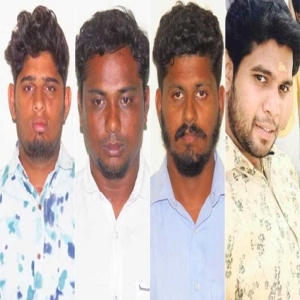
.png) M L Satyan
M L Satyan
.jpg)
A significant verdict was delivered by Judge R Nandhini Devi of Coimbatore Mahila Court on May 13, 2025. She announced the quantum of punishment against all nine men arrested in the Pollachi sexual assault case, guilty and sentenced the accused to life imprisonment till death. The people of Tamil Nadu, especially all women groups, welcomed the judgment. Most people consider the verdict a victory for women. Does this verdict convey any message? Yes, it does.
The court held the accused Thirunavukkarasu, Sabareesan, Vasantha Kumar, Satish, Manivannan, Haron Paul, Babu, Arulanantham and Arun Kumar, guilty under multiple sections of the law and ordered a total compensation of ?85 lakh for the survivors. The nine individuals faced a slew of charges, including criminal conspiracy, sexual harassment, rape, gang rape, and extortion. These charges stemmed from a series of horrifying incidents involving blackmail that occurred between 2016 and 2018.
This cruel incident needs to be taken as a warning. We must sincerely ask ourselves why these accused persons, mostly unmarried young men, involved themselves in gang rapes in an inhuman manner? What is wrong with our society, where young girls are not safe? Do our family system and child upbringing lack something crucial?
The victims in the case were predominantly college-going girls. The circulation of an audio clip purportedly featuring a victim sent shockwaves throughout Tamil Nadu, with the issue even resonating within the state legislative assembly. Following widespread outrage over the initial mishandling of the case, including the public disclosure of the survivor's identity by a police officer, the All-India Anna Dravida Munnetra Kazhagam (AIADMK) government handed the case to the CBI. The investigation traced multiple videos back to Thirunavukkarasu's farmhouse near Pollachi, where many of the assaults occurred.
The case came to light after a 19-year-old college student, Priya (name changed), filed a police complaint in February 2019. She was lured by Riswandh and taken to a car where she was assaulted by four men. The gang filmed the assault and used the footage to blackmail her. The accused persons misused the friendship and the trust of the victim girls. Several women who were victims of the chilling case of blackmail and sexual assault in Pollachi, Tamil Nadu, would have remained reluctant to lodge complaints in the case but for the Central Bureau of Investigation (CBI) team, including its Public Prosecutor. They managed to win the confidence of the survivors over time.
As India is witnessing an upsurge of sexual abuses, we tend to think that we need to protect girls. Continuous advice is given to parents: "Protect your daughters." In fact, this advice is not debated. But spontaneous questions arise: Is it enough to protect our daughters? Should we not educate our sons? Parents have a crucial role in a child's upbringing.
Hence, they could do the following:
1. Treat them equally: Never show partiality to your son and daughter. Tell that both are important. Mutual trust and support are crucial.
2. Use appropriate language: Teach children proper names for all body parts, including their genitals. Using other names for body parts may give the impression that they are bad and cannot be discussed.
3. Do not force affection: Do not force your children to give hugs or kisses. Teach your child alternate ways to show affection and respect without close physical touch.
4. Reinforce respect for each other: Discuss "good touch and bad touch". Tell them how it is never OK for anyone to look at or touch them without their permission. At the same time, they should not look at or touch others without their permission.
5. Regular Review: Some good times to talk to your children about personal safety are during bath time, bedtime, doctor visits and before any new situation. Giving them useful tips to recognise and respond to uncomfortable situations is very important. Sensitise them when rape incidents occur.
6. Prevention: Teach your children about preventive measures at various levels.
7. Answer questions: You must be open to questions your child asks, and answer appropriately depending on your child's age and ability to understand. It is always important to tell the truth.
Elder M Russell Ballard identified seven things that every parent can do to minimise the negative effect media can have on families:
1. Hold family councils and decide what the media standards are going to be.
2. Spend sufficient quality time with the children so that they understand that parents are consistently the main influence in their lives, not the media or any peer group.
3. Make good media choices and set good examples for the children.
4. Limit the amount of time the children spend watching TV, playing video games, or using the Internet each day.
5. Use 'internet filters' and 'TV program locks' to prevent children from chancing upon things they should not see.
6. Have TVs and computers in a much-used common room in the home, not in a bedroom or a private place.
7. Take time to watch appropriate media with the children and discuss with them how to make choices that will uplift and build rather than degrade and destroy.
Parents can lay the foundation in the family for self-control, proper understanding of sexuality, and healthy emotional development by providing a secure environment in which healthy attitudes will grow. Love, kindness, good communication, and appropriate ex
Within the context of a warm and loving relationship, we will have our greatest influence as we teach our children to have a proper attitude about sexuality, warn them against unhealthy and immoral practices, and instil in them the desire to remain chaste and virtuous. Responsible societies minimise negative influences that affect young children. It is our responsibility to save our youth, especially the boys, and safeguard them from moving towards disaster.